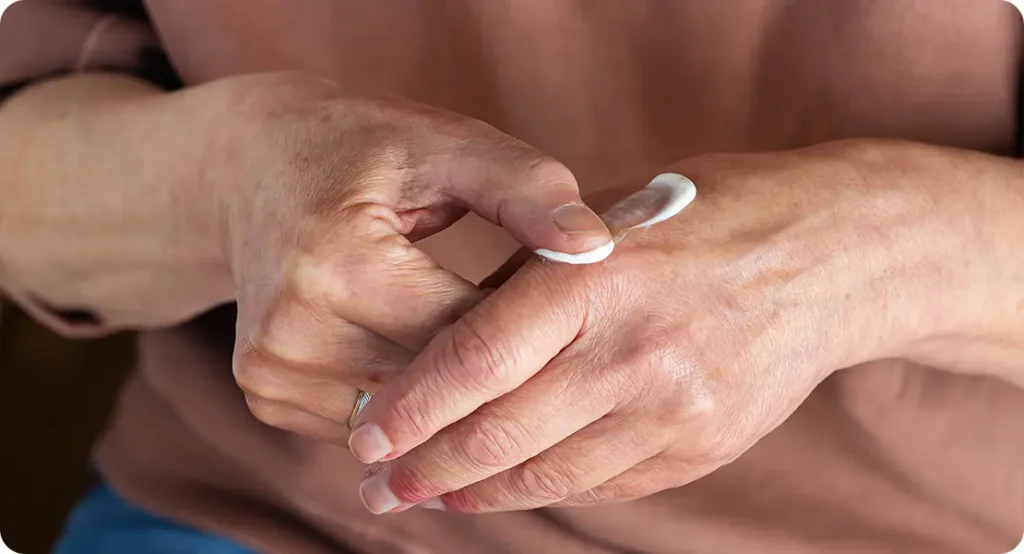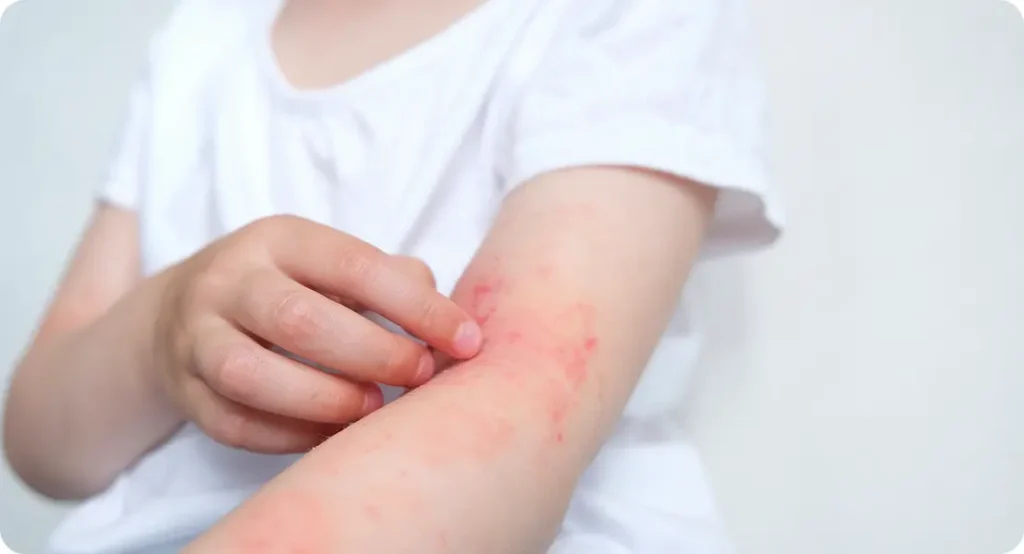Eczema isn’t just a childhood condition—it can begin at any stage of life. Adult-onset eczema is becoming increasingly common, often appearing unexpectedly in individuals with no history of the condition. The symptoms are similar to those in children: dry, itchy, inflamed skin, often with periods of flare-ups and remission. However, adults tend to experience a more persistent and widespread form, with emotional and physical tolls that affect daily life. So, can it be cured? The short answer: there’s no definitive cure, but with proper dermatological care, it can be managed very effectively.
How Is Adult-Onset Eczema Different?
While childhood eczema often improves or disappears with age, adult-onset cases typically present more chronically. In adults, eczema may first appear on the hands, face, or neck, then gradually spread. It’s also more likely to be accompanied by other conditions, such as contact dermatitis or skin infections, due to a weakened skin barrier. Adults may notice their skin takes longer to heal, and that triggers are harder to identify. Unlike childhood eczema, which can be driven by hereditary atopic tendencies, adult eczema often relates to environmental exposures, stress, and underlying health conditions.
Common Triggers in Adults
Understanding your personal triggers is vital for managing eczema long term. Adult sufferers often react to environmental allergens like dust mites, pollen, and pet dander. Harsh soaps, detergents, cold weather, and stress are also frequent culprits. Hormonal changes, especially in women during menopause, can exacerbate symptoms. Dermatologists stress the importance of identifying and avoiding triggers wherever possible, as prevention is just as crucial as treatment. Some patients may benefit from patch testing to pinpoint allergens contributing to their condition.
Diagnosis and Assessment
A dermatologist will assess adult-onset eczema through a combination of visual examination, patient history, and sometimes skin patch testing. They’ll look at where the rash appears, its severity, and whether it’s recurrent or linked to external factors. In some cases, biopsies may be taken to rule out other skin disorders. Accurate diagnosis is essential because other conditions—like psoriasis, fungal infections, or even certain cancers—can mimic eczema. Once confirmed, a treatment plan tailored to the individual’s symptoms and triggers is created.
The Role of the Skin Barrier
One of the most critical elements in eczema care is maintaining the skin’s barrier function. In adults with eczema, the outermost layer of the skin is often compromised, allowing irritants and allergens to penetrate more easily. This not only triggers inflammation but also makes the skin more susceptible to infections. Dermatologists recommend using emollients liberally and frequently to help restore this barrier. The right moisturiser—fragrance-free and rich in ceramides—can make a significant difference in reducing flare-ups and itch.
Topical Treatments
Topical corticosteroids remain a mainstay for treating active eczema flare-ups. They reduce inflammation and help calm the skin quickly. However, long-term or inappropriate use can thin the skin, so these should be used under medical supervision. For more persistent eczema, non-steroid creams like calcineurin inhibitors (e.g., tacrolimus) can be effective, particularly on sensitive areas like the face or eyelids. Dermatologists often advise a “step-down” approach—starting with stronger medications, then tapering as the skin improves.

Oral and Injectable Medications
For moderate to severe eczema that doesn’t respond well to topical treatments, systemic therapies may be considered. These include oral corticosteroids, immunosuppressants like cyclosporine, or newer biologic injectables such as dupilumab. Biologics target specific pathways in the immune response and have shown impressive results in reducing eczema severity in adults. However, these treatments are generally reserved for more serious cases and require close monitoring by a specialist due to potential side effects.
Lifestyle Modifications
Beyond medical treatments, daily habits play a big role in managing eczema. Dermatologists encourage patients to adopt a gentle skincare routine—using lukewarm water, avoiding fragranced products, and patting the skin dry instead of rubbing. Cotton clothing is preferred over wool or synthetic fabrics, which can irritate the skin. Stress management is also essential, as anxiety and emotional strain are common flare-up triggers. Techniques such as mindfulness, yoga, and regular sleep can help keep the condition in check.
The Importance of Moisturising
It might seem simple, but moisturising is one of the most effective ways to control adult eczema. A good emollient forms a protective layer over the skin, locking in moisture and shielding against irritants. Dermatologists often recommend moisturising at least twice daily—especially after bathing—to prevent the skin from drying out. Ointments tend to be more effective than lotions, particularly in colder months. Over time, consistent use of emollients can reduce reliance on medicated creams.
Eczema and Infections
Adult eczema sufferers are more prone to skin infections. Broken or scratched skin can invite bacteria like Staphylococcus aureus, leading to worsening symptoms and even systemic illness. Antiseptic creams or short courses of antibiotics may be prescribed in such cases. In more chronic scenarios, dermatologists may recommend bleach baths or antimicrobial washes to control bacterial load on the skin. Vigilance is key—early treatment of infections prevents complications and keeps eczema manageable.
The Emotional Impact
The psychological burden of adult eczema is often underestimated. Persistent itch, discomfort, and visible skin changes can lead to self-consciousness, sleep problems, and even depression. Dermatologists increasingly view eczema as a condition that affects overall wellbeing—not just the skin. In some cases, referral to a psychodermatologist or cognitive behavioural therapy (CBT) can help patients cope. Support groups and counselling also provide a space to share experiences and reduce the feeling of isolation.

Long-Term Management
Managing adult eczema requires a proactive, long-term approach. Dermatologists often describe it as a marathon, not a sprint. The goal is to minimise flare-ups, reduce the need for stronger medications, and maintain skin health. Regular follow-up appointments, patient education, and consistent skincare routines form the backbone of effective management. As research evolves, treatments continue to improve, giving hope to those who struggle with this persistent condition.
Can Adult-Onset Eczema Be Cured?
At present, there’s no definitive cure for adult-onset eczema. However, that doesn’t mean patients are without hope. With expert guidance and a personalised plan, most people can significantly reduce their symptoms and live comfortably. In many cases, flare-ups become less frequent and less severe over time. Dermatologists stress that early intervention, adherence to treatment, and a good understanding of your triggers are the best tools for managing the condition long term.
Emerging Treatments and Hope for the Future
Medical research into eczema is advancing rapidly. New biologic treatments and topical innovations offer fresh hope for adults who haven’t found relief with traditional therapies. Clinical trials are exploring how genetics, microbiomes, and immune responses contribute to eczema, potentially paving the way for tailored therapies. Dermatology clinics increasingly offer access to these newer treatments, particularly for those with severe or resistant cases. With these advancements, long-term control and even remission are becoming more attainable.
When to See a Dermatologist
If you’re dealing with adult-onset eczema, don’t wait until it becomes severe to seek help. A dermatologist can provide a clear diagnosis, uncover hidden triggers, and start you on an appropriate treatment plan. They’ll also monitor your progress and make adjustments as needed. Eczema is complex and unique to every individual—what works for one person may not work for another. Professional support makes all the difference in managing the condition effectively and improving your quality of life.

The Link Between Allergies and Adult Eczema
Many adults with late-onset eczema also develop or discover sensitivities to certain foods or airborne allergens. While eczema isn’t strictly an allergic condition, there is a strong link between immune hypersensitivity and flare-ups. For some, eliminating common allergens such as dairy, eggs, or gluten can reduce inflammation and skin irritation. Dermatologists may work in tandem with allergists to identify any contributing factors using blood tests or elimination diets. However, it’s important to avoid unnecessary food restrictions without professional advice. Instead, focus on a balanced, anti-inflammatory diet rich in omega-3 fatty acids, antioxidants, and hydration, all of which can support skin health from the inside out.
Eczema in the Workplace
Adult eczema can affect professional life more than people realise. Those working in environments with irritants—such as cleaning agents, hair products, or prolonged exposure to water—are particularly vulnerable. Occupations like catering, healthcare, and cleaning often exacerbate hand eczema, which can interfere with basic job functions. Dermatologists can provide documentation for reasonable adjustments at work and may suggest protective measures, such as cotton gloves under latex ones or frequent moisturising breaks. If untreated, eczema can lead to absenteeism or career limitations, making medical management not only a health priority but also a professional necessity for some sufferers.
Seasonal Variations and Travel Considerations
Climate has a considerable impact on eczema. Cold, dry winters tend to worsen symptoms due to reduced humidity, while extreme heat and sweating can also irritate the skin. Travelling to different climates can trigger unexpected flare-ups, especially when water quality or hygiene products vary. Dermatologists often advise patients to adapt their skincare routine according to the season—using richer emollients in winter and lighter, non-comedogenic formulas in summer. When travelling, it’s helpful to bring your own products, avoid heavily chlorinated pools, and stay hydrated. Planning ahead and making small changes can help prevent disruptions to your skin condition while enjoying a change of environment.
Hormonal Influences on Eczema
Hormones play a significant role in skin health, and for many women, eczema symptoms fluctuate with hormonal cycles. Some women experience worsening eczema during pregnancy, menstruation, or menopause, often due to changes in oestrogen levels that affect skin moisture and barrier function. Hormonal eczema can present on the face, neck, or chest and may be more resistant to treatment. Dermatologists may adjust topical treatments or suggest hormone-friendly skincare during these times. In some cases, referrals to endocrinologists or gynaecologists can provide a more holistic approach, especially when hormonal imbalance is a driving factor in chronic flare-ups.
Why Personalised Care Matters
Every adult with eczema experiences it differently—what triggers one person may not affect another at all. That’s why a personalised care plan is essential. Dermatologists take a full medical history, lifestyle factors, stress levels, and even psychological wellbeing into account when tailoring a treatment strategy. This individualised approach increases the likelihood of successful symptom control and minimises trial-and-error frustrations. Advances in dermatology now allow for more precise treatments, including genomics-guided therapies in some cases. Whether your eczema is mild or severe, having a treatment plan that reflects your needs—not a generic protocol—is key to long-term improvement and quality of life.
The Role of Sleep in Skin Recovery
Sleep is often overlooked in eczema care, but it plays a vital role in skin repair and immune regulation. Adults with eczema frequently report disturbed sleep due to intense itching, especially at night when cortisol levels drop and inflammation increases. Lack of sleep not only exacerbates flare-ups but also weakens the body’s ability to heal and fight infections. Dermatologists may suggest taking antihistamines before bed to reduce itch or using occlusive moisturisers to soothe skin overnight. Cooling your bedroom, using hypoallergenic bedding, and establishing a calming bedtime routine can all contribute to more restful nights and improved skin. Prioritising sleep is a small but powerful change in managing adult-onset eczema effectively.
Eczema and Skin Pigmentation Changes
For adults with medium to dark skin tones, eczema can cause noticeable pigmentation changes—either hyperpigmentation (dark patches) or hypopigmentation (light spots). These marks often persist long after a flare-up has subsided and can be distressing. Unlike scarring, pigmentation changes are typically not permanent, but they do require targeted treatment. Dermatologists may recommend topical treatments such as niacinamide, azelaic acid, or low-strength retinoids to help even skin tone. It’s important to treat the inflammation first before focusing on pigmentation. Sun protection is also essential, as UV exposure can worsen uneven skin tone. A tailored skincare regimen can help restore confidence along with skin clarity.

Managing Eczema During Exercise
Exercise is great for overall health but can be tricky for those with eczema. Sweat, friction, and heat are common triggers, especially during high-intensity workouts. However, dermatologists encourage patients to stay active—with some adjustments. Choose breathable, moisture-wicking clothing to minimise skin irritation, and try to avoid working out in extreme temperatures. Showering with lukewarm water and applying a gentle moisturiser immediately afterwards can help restore the skin barrier. For outdoor exercise, use sunscreen that’s formulated for sensitive skin. Managing post-workout skin care properly ensures that fitness goals can be met without compromising skin health or triggering flare-ups.
When Eczema Affects the Face
Facial eczema can be particularly challenging, both physically and emotionally. The skin on the face is thinner and more sensitive, making it more reactive to both environmental triggers and treatments. Common areas affected include the eyelids, around the mouth, and the neck. Dermatologists often opt for non-steroidal treatments on the face, such as tacrolimus or pimecrolimus, to avoid long-term side effects like thinning skin. Gentle cleansing and avoiding alcohol-based products are also crucial. For many, facial eczema leads to self-consciousness, impacting social and professional interactions. Fortunately, with specialist care and appropriate skincare products, facial eczema can be controlled without sacrificing appearance or comfort.
Support Networks and Patient Resources
Living with adult-onset eczema can feel isolating, but you’re not alone. Many clinics and national organisations offer support groups—both in-person and online—where patients can share experiences, tips, and encouragement. Dermatologists often refer patients to reputable resources such as the National Eczema Society or Eczema Outreach Support. These platforms provide evidence-based advice, news on new treatments, and forums for connecting with others. Support networks also help patients feel heard and validated, which is especially important for a condition that’s often misunderstood. Engaging with a community of others facing similar challenges can reduce stress and empower you to manage eczema more confidently.
Integrative and Complementary Approaches
While conventional medicine remains the cornerstone of eczema treatment, some adults explore complementary therapies to support their skin health. Options like acupuncture, herbal medicine, or dietary supplements such as evening primrose oil and probiotics have gained interest. Although evidence varies, some individuals report symptom relief when combining traditional and alternative approaches. Dermatologists advise caution—always discuss any new treatments with a qualified professional to ensure they won’t interfere with prescribed medications. Stress-relieving practices like meditation, tai chi, or aromatherapy can also support overall wellbeing. When used responsibly, integrative methods may provide additional comfort and empowerment in managing the daily realities of adult-onset eczema.
Final Thoughts
Adult-onset eczema can be frustrating, painful, and emotionally draining—but it’s far from hopeless. While there’s currently no cure, a wide range of treatments and strategies exist to help you take control. The key lies in understanding your skin, working closely with a dermatologist, and maintaining a consistent care routine. With the right support, it’s entirely possible to keep symptoms at bay and enjoy a normal, comfortable life. Don’t suffer in silence—help is available, and relief is within reach.
If you are suffering from adult-onset eczema, you can get in touch with us here at The London Dermatology Centre to consult with one of our expert dermatologists.
References
- National Eczema Society, 2023. Adult-Onset Eczema. [online]
- Weidinger, S. and Novak, N., 2016. Atopic dermatitis. The Lancet, 387(10023), pp.1109–1122. doi:10.1016/S0140-6736(15)00149-X.
- Simpson, E.L., Bieber, T., Guttman-Yassky, E., Beck, L.A., Blauvelt, A., Cork, M.J., Silverberg, J.I., Deleuran, M., Kataoka, Y., Lacour, J.P. and Gadkari, A., 2016. Two phase 3 trials of dupilumab versus placebo in atopic dermatitis. New England Journal of Medicine, 375(24), pp.2335–2348. doi:10.1056/NEJMoa1610020.
- Wollenberg, A., Barbarot, S., Bieber, T., Christen-Zaech, S., Deleuran, M., Fink-Wagner, A., Gelmetti, C., Gieler, U., Gottlieb, A., Heratizadeh, A. and Hoffmann, T., 2018. Consensus-based European guidelines for treatment of atopic eczema (atopic dermatitis) in adults and children: part I. Journal of the European Academy of Dermatology and Venereology, 32(5), pp.657–682. doi:10.1111/jdv.14891.
- Mayo Clinic, 2024. Atopic Dermatitis (Eczema). [online] Available at: https://www.mayoclinic.org/diseases-conditions/atopic-dermatitis-eczema/symptoms-causes/syc-20353273 [Accessed 15 May 2025].
